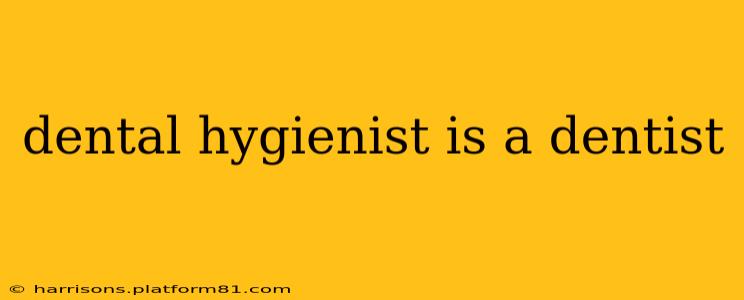The roles of a dental hygienist and a dentist are often confused, leading many to wonder, "Is a dental hygienist a dentist?" The simple answer is no. While both are crucial members of a dental healthcare team, their training, responsibilities, and scope of practice differ significantly. This article will clarify the distinctions between these two essential dental professions, answering common questions and providing a clear understanding of their respective roles.
What Does a Dentist Do?
Dentists are medical professionals who hold doctoral degrees (DMD or DDS) and are licensed to diagnose, treat, and prevent diseases and conditions of the oral cavity. Their comprehensive training encompasses a wide range of procedures, including:
- Diagnosis and Treatment of Oral Diseases: Identifying and treating conditions like cavities, gum disease (periodontal disease), oral cancer, and temporomandibular joint (TMJ) disorders.
- Restorative Dentistry: Repairing damaged teeth with fillings, crowns, bridges, and dentures.
- Cosmetic Dentistry: Enhancing the appearance of teeth through procedures like teeth whitening, veneers, and orthodontics (in some cases).
- Surgical Procedures: Performing extractions, implant placement, and other oral surgeries.
- Preventative Care: Providing advice and treatment to prevent oral health problems. This includes checkups, cleanings (though often delegated to hygienists), and fluoride treatments.
What Does a Dental Hygienist Do?
Dental hygienists are licensed healthcare professionals who provide preventative oral care services under the supervision of a dentist. Their focus is primarily on maintaining oral health and preventing disease. Key responsibilities include:
- Professional Teeth Cleaning: Removing plaque and tartar buildup from teeth, polishing, and flossing. This is a critical step in preventing gum disease and cavities.
- Oral Health Education: Educating patients on proper brushing and flossing techniques, diet, and other oral hygiene practices.
- Applying Sealants: Applying protective sealants to the chewing surfaces of teeth to prevent cavities.
- Taking X-rays: Assisting the dentist by taking and developing x-rays to aid in diagnosis.
- Applying Topical Fluoride: Applying fluoride treatments to strengthen tooth enamel and prevent decay.
Is a Dental Hygienist a Dentist? A Definitive No.
As you can see, while both professions work together to provide comprehensive oral healthcare, their roles are distinct. A dental hygienist works under the supervision of a dentist; they do not have the authority to diagnose or perform the range of treatments a dentist can. A dental hygienist requires a significantly shorter educational path than a dentist, typically earning an associate's or bachelor's degree, whereas dentists must complete dental school.
What is the Education Path for Each Profession?
Dentist Education:
Dentists undergo extensive education and training, typically completing four years of dental school after obtaining a bachelor's degree. This rigorous program covers a broad spectrum of dental knowledge and skills.
Dental Hygienist Education:
Dental hygienists typically complete an associate's or bachelor's degree program in dental hygiene. The curriculum focuses on preventive care and the clinical skills needed to provide oral hygiene services.
What are the Career Paths for Dental Hygienists and Dentists?
Both dental hygienists and dentists have diverse career paths. Dentists may open their own private practices, work in hospitals, or specialize in various areas of dentistry. Dental hygienists may work in private dental practices, public health clinics, or even corporate settings.
How Do I Choose Between Becoming a Dentist and a Dental Hygienist?
The choice depends on your interests and career goals. If you enjoy the comprehensive aspects of dentistry, including diagnosis and treatment of complex oral health problems, becoming a dentist is the right path. If you prefer a focus on preventative care and patient education, a career as a dental hygienist may be more suitable.
In conclusion, while both dental hygienists and dentists play integral roles in maintaining oral health, they are distinct professions with differing levels of education, responsibilities, and scope of practice. A dental hygienist is not a dentist, but rather an important member of the dental team working under the supervision of a dentist.
